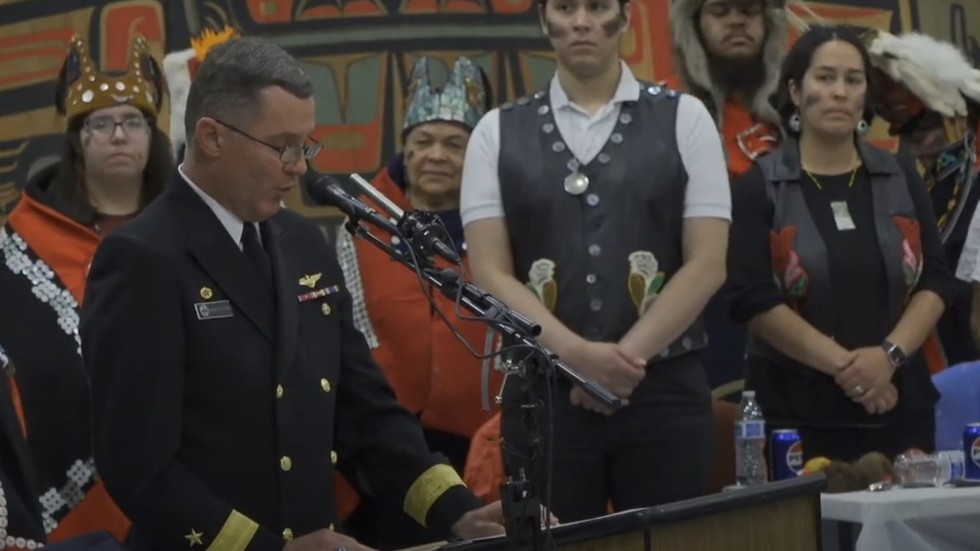The U.S. Navy has issued a formal apology to the Tlingit people of southern Alaska, acknowledging the historical atrocity inflicted upon the village of Angoon 142 years ago. This incident occurred on October 26, 1882, when American warships shelled Angoon as a reprisal for an alleged “uprising” by the local Tlingit against a whaling company. Following the bombardment, landing parties systematically destroyed the villagers’ homes, boats, and food supplies, leaving the community in dire straits as winter approached. During a commemoration ceremony in Angoon on the anniversary of the tragedy, Rear Admiral Mark Sucato expressed the Navy’s recognition of the pain and suffering caused by their actions, which he acknowledged ravaged not only lives and resources but also Tlingit culture. He emphasized the seriousness with which the Navy takes this acknowledgment and admitted that an apology had long been overdue.
Angoon, the village affected by the Navy’s assault, was eventually rebuilt, and in 1973, the Tlingit were awarded a $90,000 settlement by the U.S. government. Nevertheless, every year since then, the community has held remembrance ceremonies, during which, as reported by the Associated Press, they would ask if any representatives of the Navy were present to offer an apology. Daniel Johnson Jr., a tribal leader in Angoon, captured the enduring pain of this history, reflecting on the generations who have passed without closure. He conveyed the deep yearning within the community for acknowledgment of their grievances, saying they believed they had done nothing wrong during the conflict, indicating a desire for reconciliation and understanding of that tragic chapter in their history.
The Navy’s narrative of the events leading to the attack paints a picture of escalating tensions, rooted in an incident involving a Tlingit shaman named Tith Klane, who died in a whaling accident. According to naval accounts, the Tlingit retaliated aggressively by commandeering the whaling ship, taking hostages, and demanding 200 blankets as compensation, a claim disputed by the Tlingit. Commander Edgar C. Merriman, dispatched to quell what was described as a “Tlingit uprising,” demanded tribute in the form of 400 blankets. When the tribe only offered 81, Merriman ordered the assault on the village—the consequences of which devastated the Tlingit community. Eyewitness accounts from tribal members, including the nephew of the slain shaman, recount how the attack left many homeless and led to substantial loss of life, particularly among the young and elderly.
The legacy of the violence inflicted upon Angoon has reverberated through generations, with the harsh winter following the destruction causing great suffering among the villagers. Reports indicate that six children perished in the aftermath, along with countless elderly and infants who died due to exposure and starvation. Rosita Worl, president of the Sealaska Heritage Institute, recounted how some elders made a heartbreaking decision to walk into the woods to die, sacrificing themselves so that remaining villagers might have a better chance at survival. This grim testimony highlights the deep intergenerational trauma that has stemmed from the assault and underscores the continued struggle of the Tlingit people to come to terms with their past.
The recent apology by the U.S. Navy is part of a broader reckoning with the historical treatment of Alaska Natives since the United States acquired the territory from Russia in 1867 for $7.2 million. The military’s deployment of force against native populations during this period has prompted a push towards historical acknowledgment and reconciliation, although the recognition of these wrongdoings has come far later than many would have hoped. Last month, the Navy also apologized for the destruction of the nearby village of Kake in 1869, and the U.S. Army has plans to issue an apology for shelling the town of Wrangell during that same year, although a date for that acknowledgment has not yet been set.
Despite these recent developments, the historical injustices experienced by the Tlingit and other indigenous groups remain a sensitive subject and a vital part of the conversation surrounding reparations and acknowledgment of past wrongs. The apologies, while welcomed, are merely a small step in addressing the profound impact of colonial violence, loss of culture, and disrupted lives. The Tlingit community’s resilience is evident in their efforts to maintain their traditions and reestablish their cultural identity. The recent acknowledgment by the U.S. Navy represents both a moment of reflection on a dark chapter in history and a potential step forward in fostering understanding between the U.S. military and Native communities, paving the way for ongoing dialogue and healing from past traumas.

